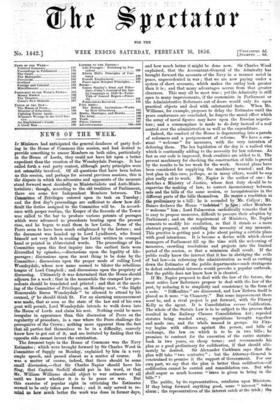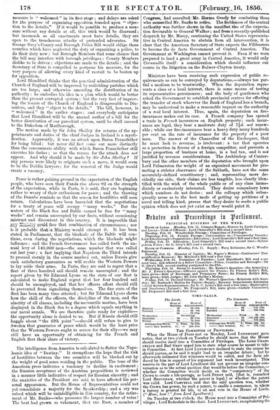NEWS OF THE WEEK.
IF Ministers had anticipated the general deadness of party feel- ing in the House of Commons this session, and had desired to provide something to amuse Members on both sides, particularly in the House of -Lords, they could not have hit upon a better expedient than the creation of the Wensleydale Peerage. It has called forth a real party contest, although party principles were not ostensibly involved. , Of all questions that have been before us this session, and perhaps for several previous sessions, this is the dispute in whir* the advocates and opponents of the measure stand forward most • decidedly as Ministerialista and Anti-Minis- ' terialists ; though-, according to the old tradition of Parliament, there are swim few Independent Members between. The Committee of Privilegeo entered upon its task on Tuesday ; and the first day's proceedings are sufficient to show how- dif- ficult the duties assigned*to the Committee will be. In accord- ance with proper reutiae, the Keeper of the Records of the Tower was called- to the bar -to produce various patents of peerages which were advanced as -precedents bearing upon the present ease, and he began to read them in law Latin. None of the Peers seem to have been much enlightened by the lecture ; and the document was handed up to Lord Lyndhurst, who found himself not very deft in reading law Latin written in cramped band or printed in abbreviated words. The proceedings of the Committee, upon this first inquiry into the earliest facts were diversified by episodes,—cliscussions upon the legality of life- peerages j diseussions upon the next thing to be done by the Committee ; discussions .upon the proper mode of calling Lord Iffengeidaleivihose new name seemed to blister the rebellious tongue of Lord Campbell ; and discussions upon the propriety of disoussing. Ultimately it was determined that the Howe should adjourn for a week ; that in the meanwhile the cramped law pre- cedents should be translated and printed ; and that at the meet- ing of the Committee of Privileges, on Monday next, " the Right Honourable Baron Wensleydale " be allowed to attend by his counsel, if be should' think fit. For an alarthing announcement was made, that as soon as the state of the law and of his own gout will permit, Lord Wensleydale intends to walk down into the House. of -Lords and claim his seat. Nothing could be more irregular in appearance than this discussion of Peers on the regularity of procedure, in a case where the Peers challenge the prerogative of the Crown ; Ulithing more, apparent than the fact that all parties feel themselves to be in a difficulty, scarcely know how to get out of it, and are irritated by finding that the opposite side cannot invent the extrication.
The foreincet topic in the House of Commons was the Navy Estimates ; which were brought forward by Sir Charles Wood in Committee of Supply on Monday, explained by him in a very ample speech, and passed almost as a matter of course. It was a matter of course, indeed, that there should be some small discussion,—that Sir Charles Napier should have his fling, that Captain "Scolielf should put in his word, or that Mr. William Williams should object to war estimates at all until we know whether it is to be peace or war, Bolt this exercise of popular right in criticizing the Estimates seemed to be only taken pro form& ; and it only served to re, Mkt' us how much better the work was done in former days, and how much better it might be done now. Sir Charles Wood explained, that the Accountant-General of the Admiralty has brought forward the accounts of the Navy in a- manner novel in peace, unprecedented in war ; that we are now paying under a system of short accounts, .which makes the outlay look greater than it is ; and that many advantages accrue from that greater clearness. This may all be most true ; yet the Admiralty is still open to many improvements, if the economists in Parliament or the Administrative Reformers out of doors would only fix upon practical objects and deal with substantial facts. When Mr. Williams, for example, proposes to delay the Estimates until the peace conferences are concluded, he forgets the moral effect which the array of naval figures may have upon the Russian negotia- tors ; and a commonplace is made to do duty instead of a real control over the administration as well as the expenditure.
Indeed, the conduct of the House is degenerating into a parade of reformers and a postponement of reforms. We have a con- stant " welcome " for measures, with the very intention of deferring them. The lax legislation of the day is a radical vice which is continually adding to the necessity for law reforms. As
fast as our code is improved, fresh crudities are added to it. The
present machinery for checking the construction of bills is proved by the results to be too weak for the work. Several plans have been considered for supplying the machinery wanted ; and the best plan in this case, perhaps, as in many others, would be any plan really set to work. Mr. Napier is the author of one : he sketches a Ministry of Justice, whose first duty should be to supervise the making of law, to correct inconsistency between acts and the bills of the same session, or inconaistencies in the different parts of the bills themselves. He murce a rosobition as the preliminary to a bill: he is seconded by 'Mr. Collyer ; Mr.
Baines declares the House " him ; other Members " welcome " him ; Lord Palmerston sardoitcally remarks that it is easy to propose measures, difficult to-procure their adoption by Parliament ; and on the - requirement of Ministers, Mr. Napier consents to modify his resolution, so that it stands as a mere
abstract proposal, not entailing the necessity of any neastoo. This practice is getting past a joke about paving a certain-place
with good intentions. It is become a device with which clever
managers of Parlianient fill up the time with the welcoming of measures, crowding resolutions and projects into- the limited
period of the session, so that a minimum shall result. If the public really knew the interest that it has in abridging the evils of bad law—in reforming the adininistration as well as cutting
down the Estimates of the public departments—such- stratagems to defeat substantial interests would provoke a popular outbreak. But the public does not know how it is cheated.
If Mr. Napier proposed to deal with the law of the future, the most active Law Reformers propose to deal with,the law-of the past, by reducing it to simplicity and consistency -in the form of
a code. " Difficulties" are discovered, and Law Reform itself is placed as it were " in Chancery." But some improvement there must be, and a rival project is put forward, with Sir Fitzroy Kelly as the agent. It is Consolidation versus Codification. The whole of the Statute Law is to be subject to the process that
resulted in the Railway Clauses Corisolidition Act; repealed statutes being weeded away, repetitions brought together and made one, and the whole massed in groups. Sir Fitz- roy begins with offences against the person, and bills of exchange, the law on which is to be in two bills ; he promises to contract for the execution of the entire statute- book in two years; on cheap terms ; and recommends his plan as a good preliminary for codification, if that should ulti- mately be desired. Sir Alexander Cockburn says that the plan will take " two centuries " ; but the Attorney-General is constrained to promise it the support of Gocerunient. For our awn part, we say that the plan is better than codification—if codification cannot be carried and consolidation can. But who !hall augur as much because "leave is given to bring in the bills " ?
The public, by its representatives, retaliates upon Ministers. If they bring forward anything good, some " interest " takes alarm ; the representatives of the interest catch at the trick ; the
measure is " welcomed " in its first stage ; and delays are asked for the purpose of organizing opposition founded upon " objec- tion to the details," If it would be possible to produce a mea- sure without any details at all this trick would be disarmed ; but inasmuch as all enactments must have details, they are open to the treacherous attacks of pretended advocates. Sir George Grey's County and Borough Police Bill would oblige those counties which have neglected the duty of organizing a police, to do their duty now ; but Borough Members find some chance ;hat the bill may interfere with borough privileges ; County Members dislike to be driven ; objections are made to the details ; and the Secretary of State is compelled to postpone his measure, for the very purpose of allowing every kind of recruit to be beaten up for opposition.
Lord Blandford thinks that the practical administration of the Church of England will be improved by redividing parishes which are too large, and otherwise amending the distribution of its authority : he embodies his idea in a plan which would be better than the present corrupted system ; but the very fact of improv- ing the tenure of the Church of England is disagreeable to Dis- senters, and they "object to the details." The bill, however, is " welcomed " in the earlier stages ; and everybody anticipates that Lord Blandford will be the annual author of a bill for the better distribution of our parochial system, until he shall succeed to the Dukedom of Marlborough. The motion made by Sir John Shelley for returns of the ap- pointments and duties of the chief Judges in Ireland is a mysti- fication. Apparently, it was an attack upon Baron Pennefather for being blind; but never did fact come out more distinctly than the consummate ability with which Baron Pennefather still executes his duties ; so that the reason for the attack does not appear. And why should it be made by Sir John Shelley If any persons were likely to originate such a move, it would seem to be the Dublin lawyers; for the removal of the Judge would create a vacancy.



























 Previous page
Previous page